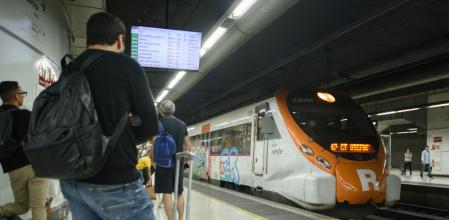Spain could have a unique public transportation ticket next year, allowing frequent users to use different means of transportation, from buses to commuter trains, metros, or trams, throughout the country in exchange for paying a kind of flat fare. High-speed rail would be excluded. The Minister of Transport, Óscar Puente, has announced the government's intention to implement this national pass in 2026, which is successfully used in countries like Germany, where for 58 euros per month, you can use different modes of transportation.
Public transportation will continue to be subsidized during the first half of this year, as it has been in the last two fiscal years. Starting in July, the subsidies will only be available to recurrent users. Puente's announcement today regarding the implementation of the single ticket system affects 2026 and would represent a revolution in passenger transportation. Users would no longer have to use different tickets depending on the means of transport or the location.
The challenge is ambitious. Public transportation is managed by different governmental levels - national, regional, and local - aiming to establish an appropriate funding model. Currently, with ticket discounts in place, a portion of the funding is provided by the State in exchange for regional or local administrations completing the subsidies.
In Germany, the so-called “Deutschland-Ticket” is funded 50% by the federal government and 50% by the states (lander). The estimated cost is around 3 billion euros, and it can be used on all public transportation except for high-speed and Intercity trains.
Puente also announced today, during a breakfast organized by Nueva Economía Forum, that the Ministry of Transport closed the year with 10.000 million of executed investment, despite the extension of the General State Budget, a figure that is expected to be exceeded in 2025 to become the second highest year of investment realized, after 2011, thirteen years ago. In one year, executed investment has grown by 23%. “The ministry will not stop if we have to work with extended budgets,” warned Puente.
Puente has rated as 'very good' the stage of corporate and economic management of Raül Blanco at the helm of Renfe
The railroad has been the main protagonist of 2024, with a special focus on the conventional network and suburban trains, where an investment of 2.330 million has been reached, ten times more than in 2016. In the conservation and maintenance of the road network, on the other hand, 1.500 million are allocated each year to reinforce road safety and circulation conditions. The debate on the implementation of tolls is not on the table.
The Ministry of Transport has explained that to date it has awarded almost all of the direct investments allocated within the framework of the Recovery Plan, with over 7.6 billion executed or in the works.
Regarding the state of the Mediterranean Corridor, Minister Puente has stated that all infrastructure is either “under construction or has the technical instruments to carry out the work.” “By 2028, a train will be able to travel from Almería to the French border at high speed,” he announced.
Puente has also offered some details about Raül Blanco's departure from the Presidency of Renfe. The minister has stated that “we both agreed that a different profile was needed” for a new stage in which the ministry wants to promote “the pure and tough management of transport.” This decision, he added, “coincided with [Blanco] having other offers,” although, if he had wanted to, Puente affirmed, Blanco could have continued leading the public railway company.
Puente has described Raül Blanco's corporate and economic management stage at Renfe as “very good,” and although he has not confirmed the appointment of Álvaro Fernández Heredia as the new president, he has emphasized that, for the minister, he is “the top transport expert in the country.” “A top-notch manager,” he added. The appointment is scheduled for next Tuesday, at the Council of Ministers.
The Minister of Transport has once again described the expansion of El Prat airport as “possible and desirable.” He has stated that he has “enormous confidence in Salvador Illa and his government” to unblock the solution “in the short term.”


